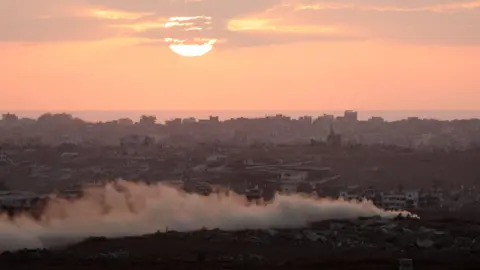In a significant shift in international relations regarding the Israeli-Palestinian conflict, US allies have begun distancing themselves from former President Donald Trump’s policies. Recently, nations such as Canada, France, and the United Kingdom have announced plans to officially recognize a Palestinian state. This strategic pivot highlights a growing concern among these nations regarding the humanitarian crisis in Gaza, particularly following the escalation of violence after the Hamas attacks on October 7, 2023. Meanwhile, the US under Trump’s administration has continued to align closely with Israel, raising questions about the future of US foreign policy in the Middle East and its long-term impact.
The backdrop of this diplomatic shift was underscored during a gathering of G7 countries in Tokyo in November 2023, where then-US Secretary of State Anthony Blinken articulated principles aimed at establishing a post-conflict framework for Gaza. Such principles included prohibiting the forcible displacement of Palestinians, rejecting any Israeli re-occupation following the conflict, and asserting that governance in Gaza must be Palestinian-led. Blinken’s proposals were intended to garner support from allies in Europe and parts of the Arab world, despite facing objections from Israeli leadership. However, these principles were largely forgotten amidst the shift in US leadership and policy direction under Trump.
As some of the United States’ closest allies, notably France and the UK, take steps to recognize Palestine, they also openly participate in discussions that aim to revive the dormant two-state solution. This transition comes as a direct response to the humanitarian crises in Gaza, where reports of starvation and violence have intensified. For instance, reports from the Integrated Food Security Phase Classification (IPC) noted alarming levels of malnutrition and disease within the besieged territory. The UK’s Foreign Secretary David Lammy emphasized the need for a cohesive approach to aid and stability in the region, pointing specifically to the critical situation faced by children amidst the ongoing violence.
The chasm between US policy and that of its allies highlights a pressing question about the future governance of Gaza. During recent interactions, US State Department officials remained vague about Trump’s long-term vision, stating that “our partners in the region” were exploring “new ideas,” but failing to provide definitive answers. This lack of clarity has led to skepticism about the administration’s intentions regarding Hamas—specifically its stance that the organization cannot be part of Gaza’s future governance.
Trump’s previous proposals, like the vision of transforming Gaza into a “riviera of the Middle East,” faced immediate backlash for their feasibility and potential violations of international law. The notion called for forced displacement of Palestinians, an idea fundamentally rejected across several global discussions. Even as the Trump administration sought to adhere to its traditional ally Israel’s objectives, the outline of a credible plan for lasting peace remains elusive.
Amid all this, as European nations leverage their diplomatic influence, they do so in hopes of shaping a new narrative around Palestinian statehood and governance. This shift not only denotes a strategic realignment within international diplomacy but also exposes an urgent need for humanitarian intervention in Gaza. The gradual and increasing divergence between US policy and its European allies signals potential long-lasting ramifications for its role in Middle Eastern affairs, with European countries asserting a role in seeking a solution independent of US influence.
With ongoing negotiations and talks led by France, the UK, and supporting Arab nations, they are now looking toward potential frameworks for governance in Palestine. Such attempts represent a collective effort to address urgent humanitarian needs while also rekindling discussions around a sustainable peace process, independent of any unilateral US assertions. For the world community, the implications of these added diplomatic efforts could be monumental in addressing the pressing issues faced in Gaza while working toward a future that affects all parties involved in the conflict.












